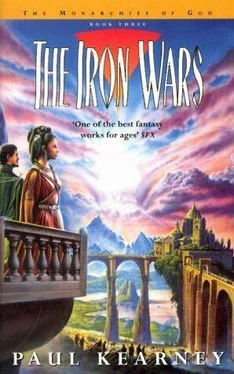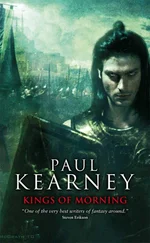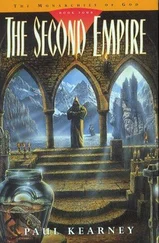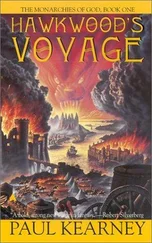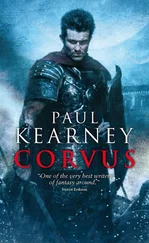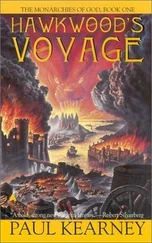Paul Kearney - The Iron Wars
Здесь есть возможность читать онлайн «Paul Kearney - The Iron Wars» весь текст электронной книги совершенно бесплатно (целиком полную версию без сокращений). В некоторых случаях можно слушать аудио, скачать через торрент в формате fb2 и присутствует краткое содержание. Жанр: Фэнтези, на английском языке. Описание произведения, (предисловие) а так же отзывы посетителей доступны на портале библиотеки ЛибКат.
- Название:The Iron Wars
- Автор:
- Жанр:
- Год:неизвестен
- ISBN:нет данных
- Рейтинг книги:4 / 5. Голосов: 1
-
Избранное:Добавить в избранное
- Отзывы:
-
Ваша оценка:
- 80
- 1
- 2
- 3
- 4
- 5
The Iron Wars: краткое содержание, описание и аннотация
Предлагаем к чтению аннотацию, описание, краткое содержание или предисловие (зависит от того, что написал сам автор книги «The Iron Wars»). Если вы не нашли необходимую информацию о книге — напишите в комментариях, мы постараемся отыскать её.
The Iron Wars — читать онлайн бесплатно полную книгу (весь текст) целиком
Ниже представлен текст книги, разбитый по страницам. Система сохранения места последней прочитанной страницы, позволяет с удобством читать онлайн бесплатно книгу «The Iron Wars», без необходимости каждый раз заново искать на чём Вы остановились. Поставьте закладку, и сможете в любой момент перейти на страницу, на которой закончили чтение.
Интервал:
Закладка:
His little army had just grown by a thousand men.
TEN
It would take not two days but three to get the command ready for the road north. Thirteen hundred men and almost two thousand horses, plus a baggage train of some two hundred mules. The entire column had been fitted out in the discarded Merduk armour which lay mouldering in a quartermaster’s warehouse, and the new men’s gear was lathered in red paint, just as that of the original Cathedrallers had been. They had looked somewhat askance at the Merduk equipment at first. Unlike Marsch and his five hundred, they possessed their own weapons and wore finely wrought mail hauberks, but Corfe had insisted that they don the same armour his original command had fought in down south. Also, he wanted heavy cavalry, the shattering impact of an armoured charge. Half of the newcomers had powerful recurved compound bows of horn and mountain yew and bristling quivers hung from their cantles, but they were now outfitted with the lances of the Merduk heavy horse. They were to be shock troops, pure and simple.
Thirteen hundred men, a thousand of whom had never been part of a regimented military command before. Corfe organized them into twenty-six troops, fifty strong each, and sprinkled the three hundred survivors of his original command throughout the new units as NCOs. Two troops made up a squadron, and four squadrons a wing: thus three wings, plus a squadron in reserve to guard the baggage and spare horses. Corfe made Andruw, Ebro and Marsch wing commanders, Ebro almost speechless with gratitude at being given a real command at last.
All very well on paper, but the reality was infinitely more complex. It took a day and a half to equip the new men and reorganize the command. Morin, it turned out, spoke good Normannic and Corfe detailed him as his adjutant and interpreter. The tribesman was none too pleased at not having command of a wing, but he knew nothing of the tactics that Corfe meant to employ, and had to be content with the promise of a field command at a later date. As it was, his pride was satisfied with relaying Corfe’s orders as though he had given them himself.
The command was heterogenous to an extreme, liable to sub-divide along the lines of tribe. The new men saw themselves as Cimbriani or Feldari rather than Cathedrallers, but once they had a few battles under their belt, Corfe knew that would change.
Their camp was a buzzing maelstrom of activity, night and day. Andruw and a couple of squadrons busied themselves with the collection of stores from a reluctant and somewhat outraged Torunnan quartermaster’s department, and had it not been for the goodwill of Quartermaster Passifal his men would never have been issued a single piece of hardtack. Others were occupied having the horses shod and the armour reconditioned, while Corfe conducted formation drill on the blasted plain north of the capital and the battlements of the city were lined with fascinated and in some cases derisive spectators.
He worked his men hard, but no harder than he worked himself. By the third day the three wings were able, with a certain amount of cursing and jostling, to move from road column to line of battle at a single trumpet call from Cerne, Corfe’s bugler. Their efforts would have made a Torunnan drill-master stare, but the end result was well enough, Corfe thought. There was no time to teach them any of the niceties. The image which chiefly disturbed him was that of his men breaking formation and reverting to some tribal warband, especially if they happened to push an enemy into flight. He impressed upon them, at campfire gatherings interpreted by Morin, that they were not to break from the line or advance without direct orders from their wing commanders. There was some muttering at this, and someone shouted out from the darkness at the back of the crowd that they were warriors not slaves, and they did not have to be taught how to fight.
“Fight my way,” Corfe shouted back. “Just once, fight my way, and if I don’t bring you to victory, then you may fight any way you please. But ask Marsch and his Felimbri if my way is not the best.”
The muttering died down. The men now knew of the battles the original Cathedrallers had fought in the south, the odds they had overcome. Corfe realized he was on trial. If he led these men to defeat, initially at any rate, then he would never be able to lead them with confidence again. They respected ability, not rank, and deeds rather than flowery declarations.
On the night before they moved out, he was summoned to meet the Queen Dowager again. He turned up at her chambers in his old, ragged uniform, aware of the whispers which followed him through the palace. Rumour was running like fire through the city: Torunn was about to be besieged as Aekir had been, the King was about to abandon the city to the enemy and pull the garrison south, a treaty was to be signed, a deal to be struck. Martellus was dead, he was victorious, he was a hostage of the Merduks. No one could tell fact from fiction, and already thousands were fleeing Torunn, lines of carriages and wagons and handcarts and trudging people heading south. At Aekir there had been hope, even confidence, that as long as John Mogen led them and the walls stood they would prevail. Here, hope was fleeing with the mobs of refugees. It sickened Corfe to his stomach. He was beginning to wonder if anything of the world he knew would survive another winter.
Odelia was alone when he was shown in, sitting by a brazier with the shadows high and dark on the walls about her.
“Lady.”
Something scuttled away from the flame-light too quickly for him to make out, but the Queen Dowager did not stir. “You have been lucky, Colonel.”
“Why is that, lady?”
“You have been almost forgotten about. Thus far, you have been overlooked.”
Corfe frowned. “I don’t know what you mean.”
“I mean that my son the King has forgotten you in the… excitement of the present time. But someone else-Colonel Menin, or I should say now General Menin-has just been made aware of your existence. The sooner you are away from the city the better.”
“I see,” Corfe said. “Does he mean to make a fight of it?”
Odelia smiled unpleasantly. “I do not know. I am no longer privy to the workings of the government. My instincts tell me that the King is timid and his general is a buffoon. Menin’s lackeys have been watching your men drilling. Tomorrow morning you will receive a new set of orders. You will be ordered to turn over your command to another, more… amenable officer who only today arrived from the south.”
“Aras,” Corfe hissed.
“The very same. According to him, you left your work there half done, and he had the lion’s share of the fighting to do while you hot-footed it back to the bed of the Queen Dowager.” Odelia’s smile was like a scar across her face in the firelight.
“I left wounded with him, the dastard.”
“I have had Passifal quarter them in an out-of-the-way place, don’t worry. But you have to get into the field, Corfe, before they ruin you.”
“We leave at dawn. Or sooner, with this.”
“Dawn should be safe enough. But no fanfare. A discreet exit is called for, I think.”
“When have you found me anything but discreet, lady?”
She laughed suddenly, like a girl. “Don’t worry, Corfe. Just make sure when you come back you have laurel on your brow, and I will do the rest. I still have strings to pull, even in the High Command. But that is not why I asked you to come here. I have something for you.” She threw aside a cloth to reveal a long, gleaming wooden box. Intrigued, but chafing at the waste of time, Corfe stepped closer.
“Well, open it!”
He did as he was bidden, and there, set in silk padding, was the shimmer of a long, bright-bladed sword.
Читать дальшеИнтервал:
Закладка:
Похожие книги на «The Iron Wars»
Представляем Вашему вниманию похожие книги на «The Iron Wars» списком для выбора. Мы отобрали схожую по названию и смыслу литературу в надежде предоставить читателям больше вариантов отыскать новые, интересные, ещё непрочитанные произведения.
Обсуждение, отзывы о книге «The Iron Wars» и просто собственные мнения читателей. Оставьте ваши комментарии, напишите, что Вы думаете о произведении, его смысле или главных героях. Укажите что конкретно понравилось, а что нет, и почему Вы так считаете.
